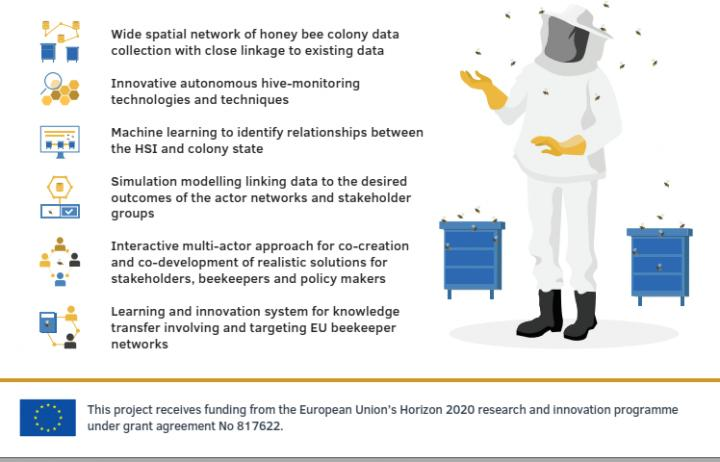Giving Beekeeping Guidance by cOmputatiOnal-assisted Decision making
Big data and innovations for healthy bees: B-GOOD project starts in June 2019
Big data, an interactive platform and six different technological innovations are the core of the recently started Horizon 2020 project B-GOOD in its 4-year mission to pave the way toward healthy and sustainable beekeeping across the European Union.

In close cooperation with the EU Bee Partnership, the project aims to develop a EU-wide bee health and management data platform, which will enable sharing of knowledge between scientists, beekeepers and other actors in the area.
To ensure interoperability and the establishment of the platform as a centralised EU bee data hub and support beekeepers in maintaining honey bees healthy, the European Food Safety Authority - EFSA's Health Status Index (HSI) will be further extended and operationalized.
This will be done for example by selection of key health indicators, creation of user-friendly protocols, development of novel tools to monitor health parameters giving attention for the honeybee gene pool.
B-GOOD's platform will utilise and further expand the open source BEEP system comprised of a monitoring device and the already functional user-friendly application for digital beekeeping logbooks.
The ultimate goal is to supply beekeepers with a decision-making tool that will provide comprehensive analysis and advice based on the flow of data from the beehives and their environment, including landscape composition and resource availability, agricultural practices and climate. To achieve this the project will rely on and expand EFSA's honey bee simulation model ApisRAM, and apply machine learning to provide linkage between bee health and environmental and management context.
While also incorporating legacy data, what makes the platform truly unique is that it will be collecting real-time data related to colony health, based on 6 different monitoring tools developed within B-GOOD. These include the use of:
- accelerometers to produce long terms statistics based on - a range of honeybee vibrations;
- gas and spatially resolved temperature measurements, quantitative physiological activity and brood;
- automated bee counters providing outside-hive mortality rates, pollen flow, drone/worker discrimination;
- sensors to detect pesticide residues;
- devices to detect honey bee viruses of high health relevance;
- analytical tool for genetic imprint.
"Our dynamic bee health and management data platform will allow us to identify correlative relationships among factors impacting the HSI, assess the risk of emerging pests and predators, and enable beekeepers' to develop adaptive management strategies that account for local and EU-wide issues," comments project co-ordinator Prof. Dirk de Graaf, Ghent University, Belgium.
Another key factor to play a role in B-GOOD's future guidance to sustainable beekeeping will be the better understanding of its socio-economics, particularly within local value chains and its relationship with bee health and the human-ecosystem equilibrium of the beekeeping sector.